The educational materials listed on this page are about Pest Management.
Producers must control a wide range of insect, weed and disease pests that can disrupt the healthy growth of crops. Given increasing resistance to chemical control methods (including organic pesticides and natural pesticides) farmers are increasingly adopting multifaceted strategies to keep pests at bay. These strategies include the biological controls and cultural controls featured in integrated pest management (IPM) as well as traditional chemical and physical controls. Integrated pest management (IPM) uses a range of ecological strategies to prevent pest damage and resorts to the use of pesticides only when monitoring indicates such action is required to avoid economic loss. Whole farm pest management systems build upon the biological pest control approach of IPM systems by integrating ecological pest management practices into all aspects of crop production. Soil organic matter and nutrient management, tillage, crop rotation and field boundaries, borders and buffers all play an important role in both increasing crop pest resistance and reducing pest pressures. Weed control is a challenge on all types of farm operations. A successful weed management plan will vary depending on the type of operation and whether it is conventional or organic. Helpful practices in an integrated weed management plan may include chemical weed control (conventional and organic herbicides), the use of mulches (living mulch or cover crops, killed mulches, plastic mulch), tillage or cultivation, crop rotation, and more novel techniques such as soil solarization or using geese or goats for weed control.
SARE’s Manage Insects on your Farm addresses the principles of ecological pest management. A Whole Farm Approach to Managing Pests provides tips for designing whole-farm pest management solutions. Managing Cover Crops Profitably, Crop Rotations on Organic Farms and Steel in the Field also provide helpful insights into the roles cover crops, rotations and tillage can play in pest management.
Farmers need to understand disease management on the farm to employ effective plant disease control methods. Becoming familiar with crop diseases means utilizing myriad effective strategies to prevent and control diseases. Various integrated management practices control the spread of disease including biological control, physical control and cultural control. Chemical control may include synthetic fungicides, while organic producers rely on an organic fungicide or other natural fungicide to aid in crop protection. For example, disease management in tomatoes, which are susceptible to many diseases, includes the use of resistant cultivars, sanitation, sound cultural practices and fungicide for tomatoes. While there are many chemicals available for different crops, such as fungicide for grass or soybean fungicides, holistic or integrated approaches to disease management are also important tools for effective plant disease control. Key practices include integrated crop and livestock systems, crop rotation, utilizing disease resistant varieties and cultivars, cultural control, biological control, physical control, chemical control, and prevention.
Showing 1-7 of 7 results
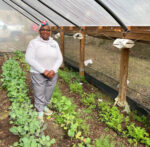
Pest Exclusion Systems for Pest Management in Vegetable Production Across the Southeast
In organic vegetable production, and in situations where farmers are seeking to reduce chemical applications, Integrated Pest Management (IPM) strategies are recommended to exclude pests in both opens fields and in high tunnels. The principles of pest exclusion involve separating the insect pest from the host plant and protecting the crop at a specific growth stage. Careful planning of both materials selected and management design are important to keeping pests out of a cash crop. This bulletin provides data and information from on-farm demonstrations on the use of pest exclusion systems. Pest exclusion systems use shade cloths as a barrier around high tunnels, low tunnels and hoop houses to exclude insect pests.
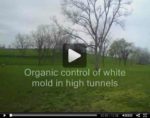
Organic Control of White Mold in High Tunnels
The fungus Sclerotinia sclerotiorum infects many of the cool-season crops produced in Kentucky. This SARE-funded video presents information on the high tunnel production system most commonly used in Kentucky; the disease cycle of S. sclerotiorum; and two control tactics compatible with national organic standards, solarization and biofumigation.
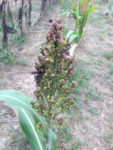
Innovations in Large-Scale Trap Cropping for Reducing Insect Pests
Trap cropping is a unique pest prevention system that uses insect behavior to deter pest feeding. Benefits of trap cropping not only include effective pest management, but trap crops can also increase biodiversity, conserve natural enemies and reduce wind damage to main crops.

High Tunnel Pest Exclusion System
Insect pests are one of the major problems in organic production systems. Organic IPM practice consists of a three-tiered approach consisting of systems-based practices, mechanical tactics, and biorational insecticides. Mechanical tactics encourage the use of physical barriers for pest exclusion. This bulletin provides preliminary research data and field observations about the success of shade cloths, or high tunnel pest exclusion (HTPE) systems, as a more permanent barrier system around the high tunnels.
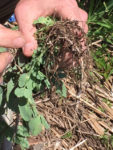
Soil Biology: Cover Crops and Disease Suppression
Cover crops provide several benefits to soil health such as improving soil structure, reducing the need for synthetic chemicals by decreasing weed biomass, increasing soil organic matter, contributing nutrients to the soil, retaining soil moisture, and decreasing soil erosion. In addition, the integration of cover crops into crop production often leads to soils that are suppressive to plant diseases (i.e. have less potential for disease development).
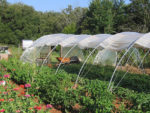
High Tunnel Crop Production Handbook
A high tunnel crop production handbook from Alabama Cooperative Extension.
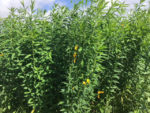
Annual Cover Crops in Florida Vegetable Systems
Fact sheet series from the University of Florida IFAS Extension on integrating cover crops in vegetable production systems in Florida.